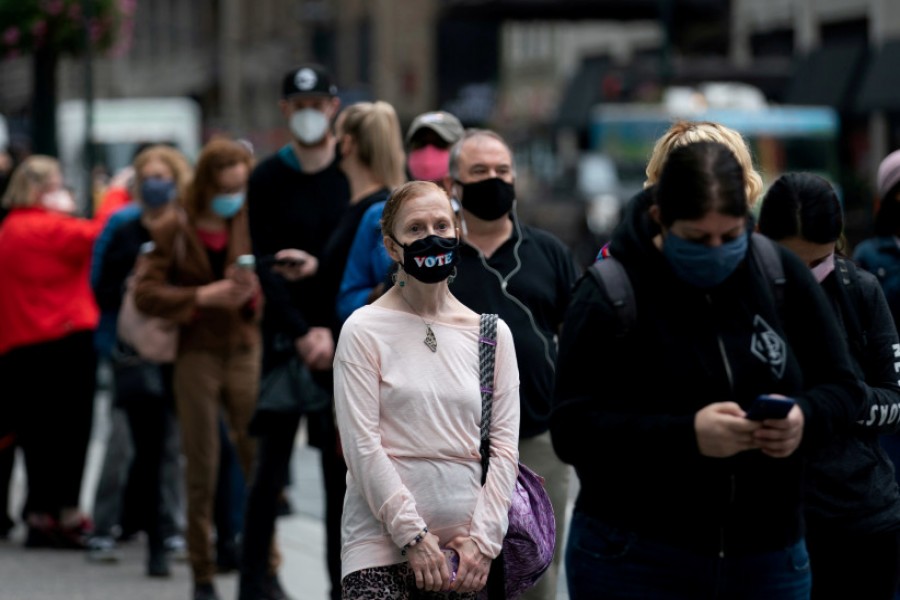Americans began casting ballots on Tuesday in an Election Day unlike any other, braving the threat of COVID-19 and the potential for violence and intimidation after one of the most polarizing presidential races in U.S. history.
In and around polling places across the country, reminders of a 2020 election year shaped by the pandemic, civil unrest and bruising political partisanship greeted voters, although more than 90 million ballots have been already submitted in an unprecedented wave of early voting.
Many wore masks to the polls — either by choice or by official mandate — with the coronavirus outbreak raging in many parts of the country.
After a summer of nationwide protests against police violence and racism, businesses in several major U.S. cities were again boarded up as a precaution against unrest, an extraordinary sight on Election Day in the United States.
In Atlanta, Georgia, about a dozen voters were lined up before sunrise at the Piedmont Park Conservancy. First in line was Ginnie House, shivering in the cold, waiting to cast a vote for the Democratic candidate Joe Biden, a former vice president seeking to replace President Donald Trump, a Republican, in the White House.
“I lost my absentee ballot and I’m not going to miss this vote,” said House, a 22-year-old actor and creative writing student in New York who had flown back just for this purpose. Of Trump, she said: “He’s dividing our country.”
In Hialeah, a predominantly Cuban suburb of Miami, Marcos Antonio Valero, 62, was voting for Trump, as he had done in 2016, and said he took the day off from his job as a construction worker to cast his ballot in person because he did not trust voting by mail.
He made no prediction as to which way Florida, a closely fought battleground state, would tip.
“It’s a secret, a mystery,” he said. “No one knows how it’s going to end until we all know.”
TENSIONS FROM TIMES SQUARE TO TEXAS
The American Civil Liberties Union and other civil rights groups said they were watching closely for signs of voter intimidation, and the U.S. Justice Department’s Civil Rights Division said it would deploy staff to 18 states.
In New York City, the Empire State Building, the Macy’s department store, and the skyscraper that houses the Trump-favored Fox News channel were among buildings that were boarded up.
On Rodeo Drive, one of the most expensive shopping streets in California’s Beverley Hills, staff stripped the display windows at Tiffany & Co. and Van Cleef & Arpels of their jewels.
“Hopefully this is all for nothing,” Kathy Gohari, vice president of the Rodeo Drive Committee, the merchants association, said on Monday as she watched workers nail plywood over luxury storefronts.
Still, fists, eggs and expletives have already flown in New York City’s Times Square in recent days among ardent Trump supporters, Democrats and adherents of the anti-fascism movement known as antifa.
An alleged plot by an anti-government militia group to kidnap Michigan’s Democratic governor, uncovered last month, has highlighted the potential for political violence on Election Day. Police in Graham, North Carolina, doused a group of anti-racism activists with pepper spray as they were marching to a polling station on Saturday.
On a Texas highway on Friday, in a spectacle reminiscent of the movie “Mad Max,” a convoy of pickup trucks mounted with billowing Trump flags surrounded a Biden-emblazoned bus filled with campaign staffers in what seemed an attempt to force the bus off the road.
Trump praised the pickup drivers as “patriots,” and expressed impatience with the Federal Bureau of Investigation when the agency said it was looking into the matter.
The fondness among some Trump supporters to form honking, traffic-jamming caravans of vehicles has spread to New York and beyond, and more such events were planned for Tuesday. Some election security experts worry the caravans could break laws, intimidate voters or spiral into violent confrontations.
Soon after the Hialeah polling station in Miami opened, a couple of large gray pick up trucks decorated with Trump flags turned into the parking lot, rolled through it slowly and left.
At a polling station at a library in Tampa, Florida, Biden supporters had set up a marquee with signs for both their candidate and for Black Lives Matter, the slogan-turned-movement around which protesters massed in cities across America this year.
After emerging, Eric Weaver, 44, said he had voted for Biden because he believed that Trump had made racists in America more brazen.
“He’s enticing these hate groups to think they’ve got a place in society,” said Weaver, a Black collections manager. “Now they feel like they can be out in public and upfront with their racism.”
Even once votes are cast, some worry that there could be a protracted ballot count, with it taking days or more before a clear winner emerges if the race is close.
As the United States has suffered through the deadliest coronavirus outbreak on the planet, many states have expanded early voting to reduce contagion-spreading crowds at polling stations.
A record-setting 97.7 million early votes had been cast either in-person or by mail as of Monday afternoon, representing about 40% of all Americans who are legally eligible to vote.


